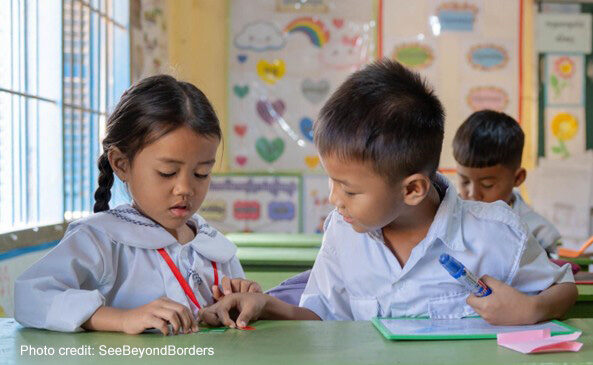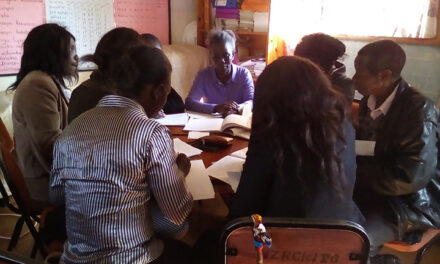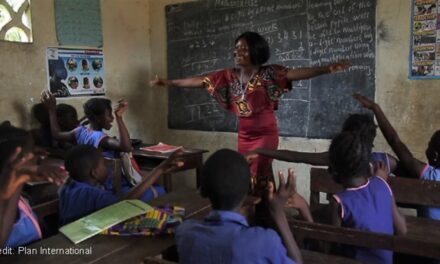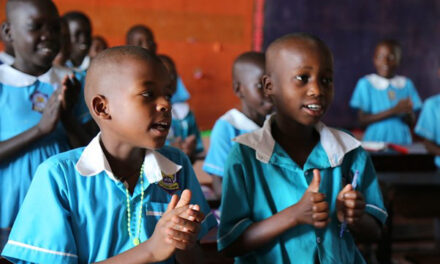This blog was written by Colm Byrne, CEO International Operations of SeeBeyondBorders.
Of all the countries that have experienced extreme trauma to their educational systems, few have suffered on a scale comparable to Cambodia. Last month marked 50 years since the Khmer Rouge came to power here. 90% of teachers were among the 1.7 million killed and the entire education system was completely and purposefully dismantled.
The context in Cambodia
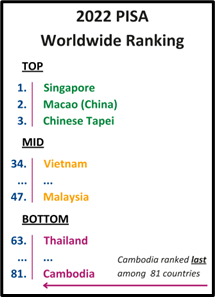 Cambodia has one of the youngest populations globally, a growing economy and so much potential. It also has a myriad of societal problems including high rates of domestic abuse, human trafficking, widespread poverty and corruption. With a Human Development Index ranking of 148, Cambodia is the lowest ranking country in Southeast Asia behind Myanmar (144), Lao (139), Vietnam (107) and Thailand (66).
Cambodia has one of the youngest populations globally, a growing economy and so much potential. It also has a myriad of societal problems including high rates of domestic abuse, human trafficking, widespread poverty and corruption. With a Human Development Index ranking of 148, Cambodia is the lowest ranking country in Southeast Asia behind Myanmar (144), Lao (139), Vietnam (107) and Thailand (66).
Nothing is as vital to Cambodia’s future as improving its education system. In Cambodia, the locally-led development organisation, SeeBeyondBorders, is seeking to transform the educational system through improving teachers’ capacity. The challenge is monumental but recent progress is heartening.
The educational context in Cambodia
The Cambodian education system is among the weakest in the world: of all 81 countries that participated in the Programme for International Student Assessment (PISA, 2022), Cambodia ranked last. With only 12% of students reaching Minimum Proficiency Levels (MPLs) in maths (OECD average: 69%), and 8% reaching MPLs in literacy (OECD average: 74%), there is what the World Bank calls ‘a learning crisis’.
Access to school is not a problem, but access to quality education is. Enrolment rates for early years are high (98%), but less than half of Cambodian children stay long enough to reach secondary school. The reason for this is clear: many children are not learning in school. There is little incentive for children and parents to value education when progress is not made in school. The lure of short-term economic benefit is appealing to impoverished families, and young people who forgo education to work in the fields or in construction, emigrate to more prosperous Thailand or Vietnam.
Teachers
Evidence shows that enhancing the skills of teachers and nurturing community engagement in educational success are the two most effective ways to improve learning outcomes for students. Upskilling, supporting and mentoring teachers is central to SeeBeyondBorders’s work. As teachers and school leaders learn and grow together in collaborative local Communities of Practice, they build the skills and expertise to significantly accelerate life-changing educational achievement for their students.
Transform Education Programme evidence base
The Transform Education Programme (TEP) is being implemented in northern Cambodia, where access to quality education is poorest and students’ educational outcomes are lowest. This means there is enormous opportunity to achieve transformational change for the most disadvantaged children and communities in Cambodia. The focus on investing in teacher development aligns with evidence-based recommendations from the Global Education Evidence Advisory Panel. It also aligns with recommendations from the Asian Development Bank on focusing on foundational maths and literacy skills.
Impact
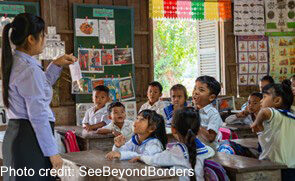 Since it was established, SeeBeyondBorders programmes have benefitted 31,000 Cambodian children with vastly improved learning outcomes. Students in supported schools are 1.8 times more likely to achieve MPLs in literacy, compared to non-participating schools, while the proportion of students achieving MPLs in maths has increased from 39% to 64%. School communities who have witnessed the transformation in children’s learning outcomes have been mobilised to now demand SeeBeyonBorders projects. (Community Reflections on Literacy Project).
Since it was established, SeeBeyondBorders programmes have benefitted 31,000 Cambodian children with vastly improved learning outcomes. Students in supported schools are 1.8 times more likely to achieve MPLs in literacy, compared to non-participating schools, while the proportion of students achieving MPLs in maths has increased from 39% to 64%. School communities who have witnessed the transformation in children’s learning outcomes have been mobilised to now demand SeeBeyonBorders projects. (Community Reflections on Literacy Project).
Why locally-led development matters
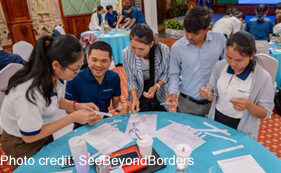 In 2025, the entire SeeBeyondBoarders Senior Leadership are Cambodians, and a local Board is in place. Cambodians are in charge of their own destiny and international staff are riding sidecar to their aspirations. Localisation makes the organisation stronger nationally and internationally and helps strengthen resilience in an increasingly uncertain world.
In 2025, the entire SeeBeyondBoarders Senior Leadership are Cambodians, and a local Board is in place. Cambodians are in charge of their own destiny and international staff are riding sidecar to their aspirations. Localisation makes the organisation stronger nationally and internationally and helps strengthen resilience in an increasingly uncertain world.
International EPIC Summit
From 14-16 July 2025, SeeBeyondBorders Cambodia will co-host the first Enhancing Pedagogy in Cambodia (EPIC) Summit in Siem Reap. This summit is a landmark event that will unite international researchers, educators, and policymakers to collaborate on innovative strategies for enhancing education, with a particular emphasis on Cambodia’s unique educational landscape.
By fostering ongoing collaboration, strengthening global partnerships, and amplifying the impact of effective educational initiatives, the Summit will provide a platform to drive meaningful and lasting improvements in Cambodian education. The summit will address key educational issues through the following themes:

